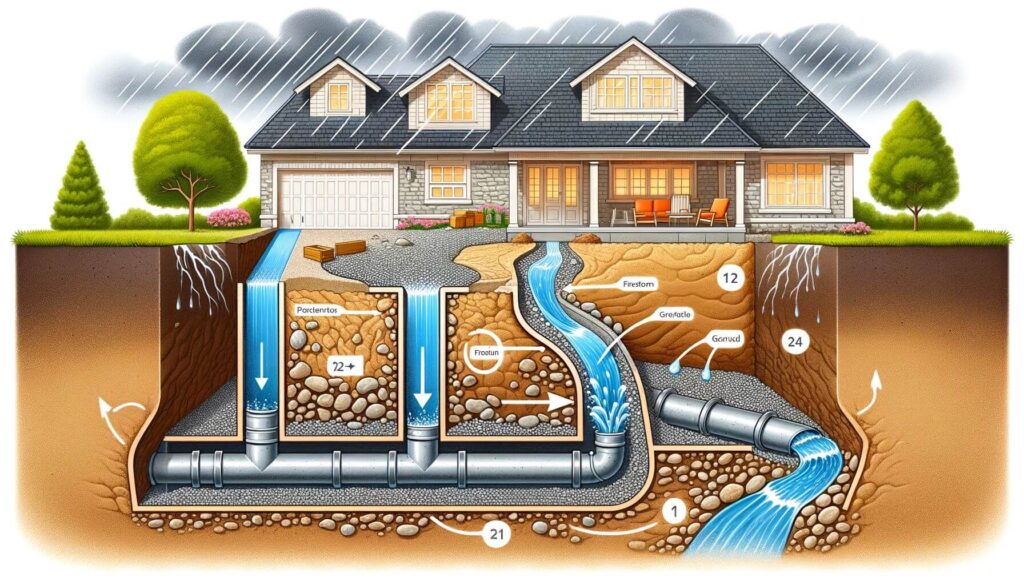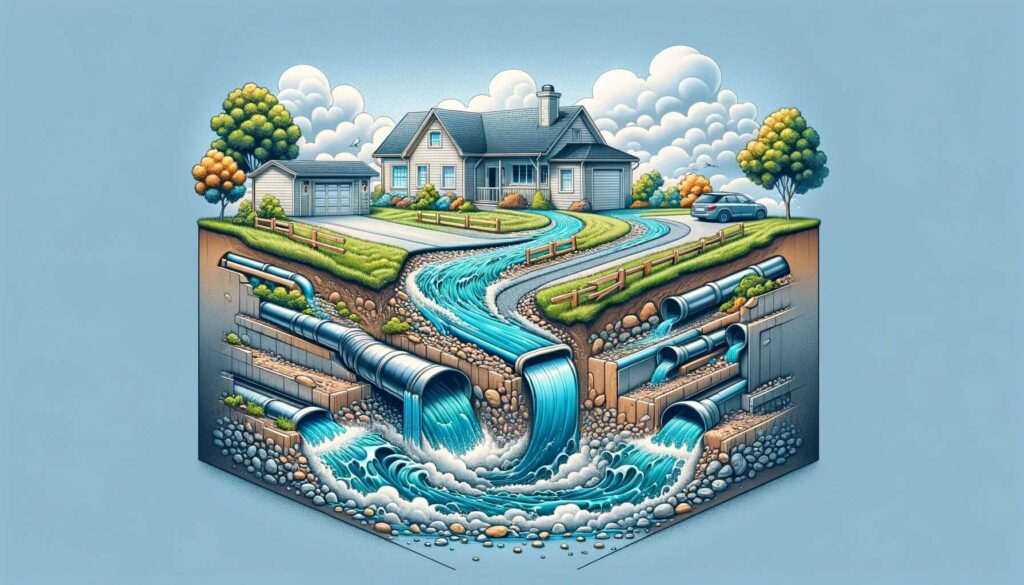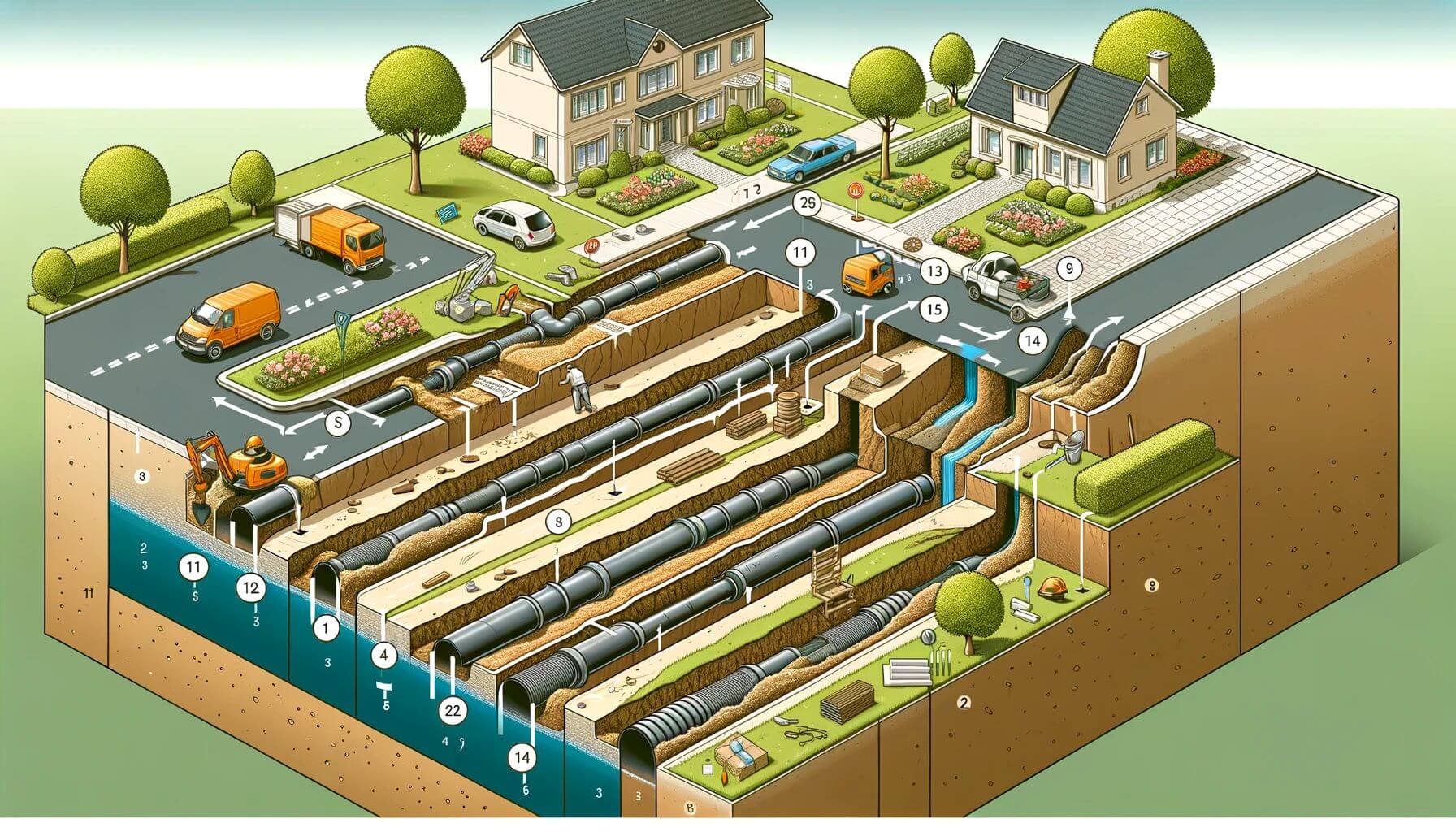Effective driveway drainage systems are crucial for maintaining the integrity and functionality of residential properties. They play a vital role in directing water away from driveways and adjacent structures, preventing a range of issues that can compromise property safety and value.
Without proper drainage, homeowners may face common problems such as water pooling on the surface, erosion of the driveway material, and potential water damage to nearby foundations and landscaping.
These issues not only pose a risk to the structural stability of the property but also create hazards for residents and visitors. Ensuring a well-designed and implemented driveway drainage solution is, therefore, essential for protecting your investment and maintaining a safe, aesthetically pleasing outdoor environment.
Understanding Driveway Drainage

Driveway drainage systems are engineered solutions designed to manage and redirect water away from driveways and adjacent areas of a building. Their primary purpose is to prevent water accumulation that can lead to driveway damage, landscape erosion, and water intrusion into basements or homes.
These systems ensure that rainfall and runoff water are efficiently channeled away, maintaining the structural integrity of the driveway and surrounding property. Inadequate driveway drainage can significantly impact property aesthetics, safety, and value.
Standing water and continuous moisture exposure can degrade driveway materials, leading to cracks, potholes, and surface erosion. This not only detracts from the property’s appearance but also creates tripping hazards and makes the driveway less accessible.
Furthermore, water that is not properly diverted can infiltrate surrounding soils, weakening the foundation of nearby structures and leading to costly repairs.
Over time, these issues can diminish the overall value of the property, making it less appealing to potential buyers. Therefore, a well-designed driveway drainage system is indispensable for preserving both the functionality and aesthetic appeal of residential properties.
Types of Driveway Drainage Solutions System
Surface Drainage Systems

Surface drainage systems use slopes and grading to direct water away from the driveway and towards designated drainage areas. This solution relies on the natural force of gravity to move water, requiring careful planning during the driveway installation process. Proper slopes and grading ensure that water flows off the driveway surface efficiently, preventing accumulation and potential damage.
Channel Drains (Trench Drains)
Channel drains, also known as trench drains, consist of a trench cut into the driveway’s surface, covered by a grate. These drains collect water over a wide area and channel it away from the driveway. The installation process involves cutting a trench across the driveway, placing the channel drain, and ensuring it connects to an appropriate discharge point. Channel drains are ideal for driveways that experience large volumes of water runoff, particularly in areas prone to heavy rain.
French Drains

French drains are designed to manage sub-surface water around driveways. They involve a trench filled with gravel or rock and a perforated pipe that redirects water away from the driveway. The structure allows water to filter through the gravel and into the pipe, moving it away from problematic areas. French drains are particularly effective in preventing water from pooling beside driveways and seeping into the ground where it can affect the foundation.
Permeable Paving
Permeable paving offers an innovative solution by using materials that allow water to pass through the surface of the driveway and into the ground beneath. This method not only manages water runoff but also replenishes groundwater supplies. Permeable pavers, porous concrete, and plastic grids filled with gravel are common materials used for permeable driveways. They are especially suited for environmentally sensitive areas where reducing runoff and erosion is a priority.
Dry Wells
Dry wells work by collecting water runoff and allowing it to slowly infiltrate into the surrounding soil. A dry well is a structure buried underground that captures water from the driveway via a pipe or trench. The water then percolates through the bottom and sides of the well, dispersing into the ground. Dry wells are an effective solution for properties where direct drainage to a storm sewer or other areas is not feasible.
Each of these driveway drainage system offers distinct benefits and is suitable for different scenarios. The choice depends on the specific drainage challenges of the property, local climate conditions, and environmental considerations.
Choosing the Right Driveway Drainage Solution

Selecting the appropriate driveway drainage solution requires careful consideration of several factors. The size of the driveway significantly impacts the choice of drainage system, as larger areas may require more complex solutions to manage water runoff effectively.
The local climate plays a crucial role; areas prone to heavy rainfall or snowmelt need robust systems that can handle high volumes of water. Soil type is another critical factor, as certain soils have lower permeability and may not drain water as quickly, necessitating specific drainage strategies.
Finally, budget constraints can influence the choice of solution, with some options being more cost-effective than others.
The importance of professional assessment cannot be overstated. A professional can evaluate the unique aspects of your property, including topography, soil conditions, and existing drainage patterns, to recommend the most effective drainage strategy. This expertise ensures that the selected solution addresses the specific needs of your driveway, preventing water-related issues and extending the lifespan of the driveway surface.
Installation Considerations
The general installation process for driveway drainage systems varies depending on the type of solution chosen. It typically involves site assessment, planning and design, excavation or trenching, installation of drainage components (such as pipes, drains, or permeable materials), and final landscaping or surface restoration. Each step must be executed with precision to ensure the system functions as intended.
Driveway Drainage Contractors Near Me
Hiring experienced professionals for the installation is crucial for several reasons:
First, they have the technical knowledge and equipment to install the system correctly. Mistakes during installation can lead to ineffective drainage, potentially causing more problems than the system was meant to solve.
Second, professionals can ensure the project complies with local building codes and regulations, avoiding legal issues.
Lastly, experienced driveway drain installers can provide warranties or guarantees on their work, offering you peace of mind that their investment is protected.
In summary, choosing and installing the right driveway drainage solution is a complex process that benefits significantly from professional input. By considering key factors and relying on expert installation, homeowners can ensure effective management of water runoff, safeguarding their property for years to come.
Maintenance Tips for Driveway Drainage Systems

Proper maintenance is essential for ensuring the long-term functionality of any driveway drainage system. Regular upkeep helps prevent blockages and damage, ensuring efficient water management. Here are maintenance tips for various types of driveway drainage solutions:
Regular Inspections
- Conduct regular inspections, especially after heavy rainfalls or storms, to check for any signs of overflow or water pooling, which indicate potential blockages or issues with the system’s capacity to handle water.
Cleaning Out Debris
- Channel and Trench Drains: Remove the grate covers and clear out leaves, twigs, and any debris that could clog the channels. High-pressure water can help flush out accumulated sediment.
- French Drains: Ensure the area around the discharge point is clear of debris. If water flow seems restricted, it may be necessary to remove sediment or roots infiltrating the pipe.
- Permeable Paving: Remove debris and sediments from the surface regularly. A stiff brush and hose can be used to clean the paving, maintaining its permeability.
Checking for Signs of Blockage or Damage
- Inspect for visible damage such as cracks in the grates or paving, which can compromise the system’s integrity.
- Look for signs of subsidence or uneven settling around drains and paving, indicating underlying issues that may need professional attention.
- Monitor drainage flow during rain to identify any slow-moving or standing water areas, suggesting a blockage or inadequate slope.
Additional Maintenance Tips
- Dry Wells: Check the well periodically to ensure it’s not filled with sediment, which can reduce its effectiveness. Removal of accumulated materials may be required to maintain performance.
- Soil and Landscape Maintenance: Keep surrounding landscaping healthy to prevent soil erosion that could affect the drainage slope or introduce more debris into the system.
By following these maintenance tips, you can significantly extend the lifespan of your driveway water drain systems, ensuring they continue to protect the property from water damage efficiently. Regular maintenance not only keeps the system working properly but also helps in identifying potential issues before they become costly repairs.
Benefits of Effective Driveway Drain System

A well-designed driveway drainage system offers numerous advantages that extend beyond mere water management.
Here’s a summary of the key benefits a drain system for driveway :
Preventing Water Damage
- Protects the Structure: By efficiently channeling water away from the driveway and adjacent structures, effective drainage prevents water infiltration that can weaken foundations and cause costly damage.
- Preserves Driveway Surface: It minimizes the risk of erosion, cracks, and potholes in the driveway surface, maintaining its integrity and appearance over time.
Improving Property Value
- Enhances Aesthetics: A well-maintained driveway with proper drainage contributes to the overall curb appeal of the property, making a positive first impression on visitors and potential buyers.
- Increases Marketability: Homes with robust drainage solutions are more appealing to buyers, as they indicate a well-maintained property with reduced risk of water-related issues.
Enhancing Safety
- Reduces Slip Hazards: By eliminating standing water, effective drainage minimizes the risk of slip-and-fall accidents on the property.
- Improves Accessibility: During adverse weather conditions, such as heavy rainfall or melting snow, a functional drainage system ensures the driveway remains accessible and safe for vehicles and pedestrians alike.
In summary, investing in an effective driveway drainage system is a wise decision for homeowners. It not only safeguards the property from potential water damage but also enhances its value and safety, ensuring a secure and appealing environment for years to come.
Final Thought on Driveway Drains
In this article, we’ve explored the critical role that effective driveway drainage systems play in maintaining the structural integrity and aesthetics of residential properties. We discussed various types of driveway drainage solutions, including surface drainage systems, channel (trench) drains, French drains, permeable paving, and dry wells, each offering unique benefits to address specific water management needs. Key considerations for selecting the right driveway drainage solution were highlighted, emphasizing the importance of factors such as driveway size, local climate, soil type, and budget. Installation considerations underscored the value of professional assessment and expertise to ensure the system’s effectiveness and durability. Furthermore, we provided maintenance tips to ensure long-term functionality, and outlined the significant benefits of having a well-designed driveway drainage system, including preventing water damage, improving property value, and enhancing safety.
We encourage homeowners to carefully evaluate their driveway drainage needs. Considering the complexity and the critical importance of effective water management, consulting with professionals to assess your specific situation and implement the most suitable drainage solution is highly recommended. A well-planned and properly maintained driveway drainage system is an investment in your property’s future, safeguarding against potential issues and contributing to its overall value and safety.


Leave a Reply